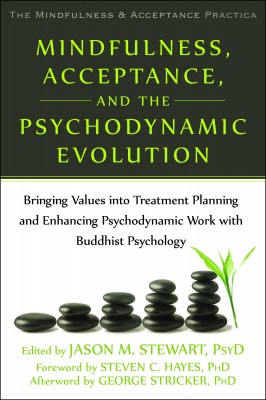 Mindfulness, Acceptance, and the Psychodynamic Evolution (2014) is a theoretical blending of mindfulness-based theory and contemporary psychodynamic thinking, a book with much to offer counseling professionals. The text begins with a foreword, preface and introduction, that describe the evolution of third wave cognitive-behavior therapy (e.g., acceptance and commitment therapy, dialectical behavior therapy), as well as current theory in psychodynamic therapy (e.g., functional analytic psychotherapy, relational psychodynamic perspectives). The authors then move to describing the role of theory integration, and posit mindfulness as a common therapeutic factor.
Mindfulness, Acceptance, and the Psychodynamic Evolution (2014) is a theoretical blending of mindfulness-based theory and contemporary psychodynamic thinking, a book with much to offer counseling professionals. The text begins with a foreword, preface and introduction, that describe the evolution of third wave cognitive-behavior therapy (e.g., acceptance and commitment therapy, dialectical behavior therapy), as well as current theory in psychodynamic therapy (e.g., functional analytic psychotherapy, relational psychodynamic perspectives). The authors then move to describing the role of theory integration, and posit mindfulness as a common therapeutic factor.
Throughout the next chapters, the authors expand on the psychodynamic perspective and mindfulness in addition to the role of curiosity in the therapist’s stance in session and the therapeutic relationship. Particularly poignant are chapters 3, 4 and 5, which are almost exclusively devoted to Buddhist thought and its connection to modern mindfulness and psychodynamic theory. Chapter 6 describes the concept of mentalization and mindfulness, with connections for enhancing mentalization in children through play therapy. Chapter 7 contains a personal account of mindfulness practice from one of the authors. Chapters 8–10 focus heavily on the functional contextual theories of acceptance and commitment therapy and dialectical behavioral therapy, and their associations with mindfulness and psychoanalysis. Chapter 11 guides the reader through the nuances of both psychoanalysis and acceptance and commitment therapy, with the authors providing commentary from both perspectives applied to clinical case vignettes. The concluding chapter, 12, describes the five guidelines of functional analytic psychotherapy. This chapter also includes the role of values and a discussion of relational psychodynamic thought.
Throughout this text, modern psychodynamic theory is applied to mindfulness concepts, which include acceptance, nonjudgmental awareness, curiosity, letting go and the power of the present moment. The philosophical epistemology of mindfulness and psychodynamic theory are included within the text, with respect to individuals’ unique social construction of their contexts. There are roughly 18 separate clinical case scenarios included within this text, which the authors use to skillfully demonstrate the topics of each chapter.
Mindfulness, Acceptance, and the Psychodynamic Evolution is a well authored text; each individual contributor adds more to the narrative and enhances the reader’s experience. Regardless of whether one’s theoretical orientation falls within the psychodynamic framework, every clinician has something to gain from reading this book. The blossoming research on mindfulness within the field of counseling demonstrates the importance of the topic, and reading this book is a worthwhile venture. The text is very thorough, with delicate care taken to provide the reader with a wealth of accessible information. A strong point of Mindfulness, Acceptance, and the Psychodynamic Evolution is the outstanding number of case studies included, which provide both the conceptual framework and strategies for clinical application.
As stated above, a counselor need not subscribe to a psychodynamic theoretical orientation to benefit from this text; however, the book does contain information on advanced modern psychodynamic theory and mindfulness. If the reader is opposed to psychoanalytic thinking or unaware of its concepts, the reading experience may be more difficult to comprehend. However, the authors adeptly deconstruct the specifics of modern psychodynamic and mindfulness concepts, making comprehension of psychodynamic and mindfulness theories possible for readers less experienced in either theory.
This text has direct application for various types of counseling professionals, particularly those with clinical, supervisory and consulting roles. The authors provide the conceptual narrative germinated with clinical case vignettes, perfect for therapists providing direct client services. Mindfulness, Acceptance, and the Psychodynamic Evolution includes cases with children, adolescents and adults, furthering the utility of the book.
Stewart, J. M. (Ed.). (2014). Mindfulness, acceptance, and the psychodynamic evolution: Bringing values into treatment planning and enhancing psychodynamic work with Buddhist psychology. Oakland, CA: New Harbinger.
Reviewed by: George E. Harrington III, Barry University, Miami, FL.
The Professional Counselor
